微服务权限终极解决方案,Spring Cloud Gateway + Oauth2 实现统一认证和鉴权!
最近发现了一个很好的微服务权限解决方案,可以通过认证服务进行统一认证,然后通过网关来统一校验认证和鉴权。此方案为目前最新方案,仅支持Spring Boot 2.2.0、Spring Cloud Hoxton 以上版本,本文将详细介绍该方案的实现,希望对大家有所帮助!
前置知识
我们将采用Nacos作为注册中心,Gateway作为网关,使用 nimbus-jose-jwt JWT库操作JWT令牌,对这些技术不了解的朋友可以看下下面的文章。
-
Spring Cloud Gateway:新一代API网关服务
-
Spring Cloud Alibaba:Nacos 作为注册中心和配置中心使用
-
听说你的JWT库用起来特别扭,推荐这款贼好用的!
应用架构
我们理想的解决方案应该是这样的,认证服务负责认证,网关负责校验认证和鉴权,其他API服务负责处理自己的业务逻辑。安全相关的逻辑只存在于认证服务和网关服务中,其他服务只是单纯地提供服务而没有任何安全相关逻辑。
相关服务划分:
-
micro-oauth2-gateway:网关服务,负责请求转发和鉴权功能,整合Spring Security+Oauth2;
-
micro-oauth2-auth:Oauth2认证服务,负责对登录用户进行认证,整合Spring Security+Oauth2;
-
micro-oauth2-api:受保护的API服务,用户鉴权通过后可以访问该服务,不整合Spring Security+Oauth2。
方案实现
下面介绍下这套解决方案的具体实现,依次搭建认证服务、网关服务和API服务。
micro-oauth2-auth
我们首先来搭建认证服务,它将作为Oauth2的认证服务使用,并且网关服务的鉴权功能也需要依赖它。
-
在
pom.xml中添加相关依赖,主要是Spring Security、Oauth2、JWT、Redis相关依赖;
<dependencies>
<dependency>
<groupId>org.springframework.boot</groupId>
<artifactId>spring-boot-starter-web</artifactId>
</dependency>
<dependency>
<groupId>org.springframework.boot</groupId>
<artifactId>spring-boot-starter-security</artifactId>
</dependency>
<dependency>
<groupId>org.springframework.cloud</groupId>
<artifactId>spring-cloud-starter-oauth2</artifactId>
</dependency>
<dependency>
<groupId>com.nimbusds</groupId>
<artifactId>nimbus-jose-jwt</artifactId>
<version>8.16</version>
</dependency>
<!-- redis -->
<dependency>
<groupId>org.springframework.boot</groupId>
<artifactId>spring-boot-starter-data-redis</artifactId>
</dependency>
</dependencies>
-
在
application.yml中添加相关配置,主要是Nacos和Redis相关配置;
server:
port: 9401
spring:
profiles:
active: dev
application:
name: micro-oauth2-auth
cloud:
nacos:
discovery:
server-addr: localhost:8848
jackson:
date-format: yyyy-MM-dd HH:mm:ss
redis:
database: 0
port: 6379
host: localhost
password:
management:
endpoints:
web:
exposure:
include: "*"
-
keytool jwt.jks resource bin
keytool -genkey -alias jwt -keyalg RSA -keystore jwt.jks
-
创建
UserServiceImpl类实现Spring Security的UserDetailsService接口,用于加载用户信息;
/**
* 用户管理业务类
* Created by macro on 2020/6/19.
*/
@Service
public class UserServiceImpl implements UserDetailsService {
private List<UserDTO> userList;
@Autowired
private PasswordEncoder passwordEncoder;
@PostConstruct
public void initData() {
String password = passwordEncoder.encode("123456");
userList = new ArrayList<>();
userList.add(new UserDTO(1L,"macro", password,1, CollUtil.toList("ADMIN")));
userList.add(new UserDTO(2L,"andy", password,1, CollUtil.toList("TEST")));
}
@Override
public UserDetails loadUserByUsername(String username) throws UsernameNotFoundException {
List<UserDTO> findUserList = userList.stream().filter(item -> item.getUsername().equals(username)).collect(Collectors.toList());
if (CollUtil.isEmpty(findUserList)) {
throw new UsernameNotFoundException(MessageConstant.USERNAME_PASSWORD_ERROR);
}
SecurityUser securityUser = new SecurityUser(findUserList.get(0));
if (!securityUser.isEnabled()) {
throw new DisabledException(MessageConstant.ACCOUNT_DISABLED);
} else if (!securityUser.isAccountNonLocked()) {
throw new LockedException(MessageConstant.ACCOUNT_LOCKED);
} else if (!securityUser.isAccountNonExpired()) {
throw new AccountExpiredException(MessageConstant.ACCOUNT_EXPIRED);
} else if (!securityUser.isCredentialsNonExpired()) {
throw new CredentialsExpiredException(MessageConstant.CREDENTIALS_EXPIRED);
}
return securityUser;
}
}
-
Oauth2ServerConfig UserServiceImpl KeyPair
/**
* 认证服务器配置
* Created by macro on 2020/6/19.
*/
@AllArgsConstructor
@Configuration
@EnableAuthorizationServer
public class Oauth2ServerConfig extends AuthorizationServerConfigurerAdapter {
private final PasswordEncoder passwordEncoder;
private final UserServiceImpl userDetailsService;
private final AuthenticationManager authenticationManager;
private final JwtTokenEnhancer jwtTokenEnhancer;
@Override
public void configure(ClientDetailsServiceConfigurer clients) throws Exception {
clients.inMemory()
.withClient("client-app")
.secret(passwordEncoder.encode("123456"))
.scopes("all")
.authorizedGrantTypes("password", "refresh_token")
.accessTokenValiditySeconds(3600)
.refreshTokenValiditySeconds(86400);
}
@Override
public void configure(AuthorizationServerEndpointsConfigurer endpoints) throws Exception {
TokenEnhancerChain enhancerChain = new TokenEnhancerChain();
List<TokenEnhancer> delegates = new ArrayList<>();
delegates.add(jwtTokenEnhancer);
delegates.add(accessTokenConverter());
enhancerChain.setTokenEnhancers(delegates); //配置JWT的内容增强器
endpoints.authenticationManager(authenticationManager)
.userDetailsService(userDetailsService) //配置加载用户信息的服务
.accessTokenConverter(accessTokenConverter())
.tokenEnhancer(enhancerChain);
}
@Override
public void configure(AuthorizationServerSecurityConfigurer security) throws Exception {
security.allowFormAuthenticationForClients();
}
@Bean
public JwtAccessTokenConverter accessTokenConverter() {
JwtAccessTokenConverter jwtAccessTokenConverter = new JwtAccessTokenConverter();
jwtAccessTokenConverter.setKeyPair(keyPair());
return jwtAccessTokenConverter;
}
@Bean
public KeyPair keyPair() {
//从classpath下的证书中获取秘钥对
KeyStoreKeyFactory keyStoreKeyFactory = new KeyStoreKeyFactory(new ClassPathResource("jwt.jks"), "123456".toCharArray());
return keyStoreKeyFactory.getKeyPair("jwt", "123456".toCharArray());
}
}
-
如果你想往JWT中添加自定义信息的话,比如说
登录用户的ID,可以自己实现TokenEnhancer接口;
/**
* JWT内容增强器
* Created by macro on 2020/6/19.
*/
@Component
public class JwtTokenEnhancer implements TokenEnhancer {
@Override
public OAuth2AccessToken enhance(OAuth2AccessToken accessToken, OAuth2Authentication authentication) {
SecurityUser securityUser = (SecurityUser) authentication.getPrincipal();
Map<String, Object> info = new HashMap<>();
//把用户ID设置到JWT中
info.put("id", securityUser.getId());
((DefaultOAuth2AccessToken) accessToken).setAdditionalInformation(info);
return accessToken;
}
}
-
由于我们的网关服务需要RSA的公钥来验证签名是否合法,所以认证服务需要有个接口把公钥暴露出来;
/**
* 获取RSA公钥接口
* Created by macro on 2020/6/19.
*/
@RestController
public class KeyPairController {
@Autowired
private KeyPair keyPair;
@GetMapping("/rsa/publicKey")
public Map<String, Object> getKey() {
RSAPublicKey publicKey = (RSAPublicKey) keyPair.getPublic();
RSAKey key = new RSAKey.Builder(publicKey).build();
return new JWKSet(key).toJSONObject();
}
}
-
不要忘了还需要配置Spring Security,允许获取公钥接口的访问;
/**
* SpringSecurity配置
* Created by macro on 2020/6/19.
*/
@Configuration
@EnableWebSecurity
public class WebSecurityConfig extends WebSecurityConfigurerAdapter {
@Override
protected void configure(HttpSecurity http) throws Exception {
http.authorizeRequests()
.requestMatchers(EndpointRequest.toAnyEndpoint()).permitAll()
.antMatchers("/rsa/publicKey").permitAll()
.anyRequest().authenticated();
}
@Bean
@Override
public AuthenticationManager authenticationManagerBean() throws Exception {
return super.authenticationManagerBean();
}
@Bean
public PasswordEncoder passwordEncoder() {
return new BCryptPasswordEncoder();
}
}
-
创建一个资源服务
ResourceServiceImpl,初始化的时候把资源与角色匹配关系缓存到Redis中,方便网关服务进行鉴权的时候获取。
/**
* 资源与角色匹配关系管理业务类
* Created by macro on 2020/6/19.
*/
@Service
public class ResourceServiceImpl {
private Map<String, List<String>> resourceRolesMap;
@Autowired
private RedisTemplate<String,Object> redisTemplate;
@PostConstruct
public void initData() {
resourceRolesMap = new TreeMap<>();
resourceRolesMap.put("/api/hello", CollUtil.toList("ADMIN"));
resourceRolesMap.put("/api/user/currentUser", CollUtil.toList("ADMIN", "TEST"));
redisTemplate.opsForHash().putAll(RedisConstant.RESOURCE_ROLES_MAP, resourceRolesMap);
}
}
micro-oauth2-gateway
接下来我们就可以搭建网关服务了,它将作为Oauth2的资源服务、客户端服务使用,对访问微服务的请求进行统一的校验认证和鉴权操作。
-
在
pom.xml中添加相关依赖,主要是Gateway、Oauth2和JWT相关依赖;
<dependencies>
<dependency>
<groupId>org.springframework.boot</groupId>
<artifactId>spring-boot-starter-webflux</artifactId>
</dependency>
<dependency>
<groupId>org.springframework.cloud</groupId>
<artifactId>spring-cloud-starter-gateway</artifactId>
</dependency>
<dependency>
<groupId>org.springframework.security</groupId>
<artifactId>spring-security-config</artifactId>
</dependency>
<dependency>
<groupId>org.springframework.security</groupId>
<artifactId>spring-security-oauth2-resource-server</artifactId>
</dependency>
<dependency>
<groupId>org.springframework.security</groupId>
<artifactId>spring-security-oauth2-client</artifactId>
</dependency>
<dependency>
<groupId>org.springframework.security</groupId>
<artifactId>spring-security-oauth2-jose</artifactId>
</dependency>
<dependency>
<groupId>com.nimbusds</groupId>
<artifactId>nimbus-jose-jwt</artifactId>
<version>8.16</version>
</dependency>
</dependencies>
-
在
application.yml中添加相关配置,主要是路由规则的配置、Oauth2中RSA公钥的配置及路由白名单的配置;
server:
port: 9201
spring:
profiles:
active: dev
application:
name: micro-oauth2-gateway
cloud:
nacos:
discovery:
server-addr: localhost:8848
gateway:
routes: #配置路由规则
- id: oauth2-api-route
uri: lb://micro-oauth2-api
predicates:
- Path=/api/**
filters:
- StripPrefix=1
- id: oauth2-auth-route
uri: lb://micro-oauth2-auth
predicates:
- Path=/auth/**
filters:
- StripPrefix=1
discovery:
locator:
enabled: true #开启从注册中心动态创建路由的功能
lower-case-service-id: true #使用小写服务名,默认是大写
security:
oauth2:
resourceserver:
jwt:
jwk-set-uri: 'http://localhost:9401/rsa/publicKey' #配置RSA的公钥访问地址
redis:
database: 0
port: 6379
host: localhost
password:
secure:
ignore:
urls: #配置白名单路径
- "/actuator/**"
- "/auth/oauth/token"
-
对网关服务进行配置安全配置,由于Gateway使用的是
WebFlux,所以需要使用@EnableWebFluxSecurity注解开启;
/**
* 资源服务器配置
* Created by macro on 2020/6/19.
*/
@AllArgsConstructor
@Configuration
@EnableWebFluxSecurity
public class ResourceServerConfig {
private final AuthorizationManager authorizationManager;
private final IgnoreUrlsConfig ignoreUrlsConfig;
private final RestfulAccessDeniedHandler restfulAccessDeniedHandler;
private final RestAuthenticationEntryPoint restAuthenticationEntryPoint;
@Bean
public SecurityWebFilterChain springSecurityFilterChain(ServerHttpSecurity http) {
http.oauth2ResourceServer().jwt()
.jwtAuthenticationConverter(jwtAuthenticationConverter());
http.authorizeExchange()
.pathMatchers(ArrayUtil.toArray(ignoreUrlsConfig.getUrls(),String.class)).permitAll()//白名单配置
.anyExchange().access(authorizationManager)//鉴权管理器配置
.and().exceptionHandling()
.accessDeniedHandler(restfulAccessDeniedHandler)//处理未授权
.authenticationEntryPoint(restAuthenticationEntryPoint)//处理未认证
.and().csrf().disable();
return http.build();
}
@Bean
public Converter<Jwt, ? extends Mono<? extends AbstractAuthenticationToken>> jwtAuthenticationConverter() {
JwtGrantedAuthoritiesConverter jwtGrantedAuthoritiesConverter = new JwtGrantedAuthoritiesConverter();
jwtGrantedAuthoritiesConverter.setAuthorityPrefix(AuthConstant.AUTHORITY_PREFIX);
jwtGrantedAuthoritiesConverter.setAuthoritiesClaimName(AuthConstant.AUTHORITY_CLAIM_NAME);
JwtAuthenticationConverter jwtAuthenticationConverter = new JwtAuthenticationConverter();
jwtAuthenticationConverter.setJwtGrantedAuthoritiesConverter(jwtGrantedAuthoritiesConverter);
return new ReactiveJwtAuthenticationConverterAdapter(jwtAuthenticationConverter);
}
}
-
在
WebFluxSecurity中自定义鉴权操作需要实现ReactiveAuthorizationManager接口;
/**
* 鉴权管理器,用于判断是否有资源的访问权限
* Created by macro on 2020/6/19.
*/
@Component
public class AuthorizationManager implements ReactiveAuthorizationManager<AuthorizationContext> {
@Autowired
private RedisTemplate<String,Object> redisTemplate;
@Override
public Mono<AuthorizationDecision> check(Mono<Authentication> mono, AuthorizationContext authorizationContext) {
//从Redis中获取当前路径可访问角色列表
URI uri = authorizationContext.getExchange().getRequest().getURI();
Object obj = redisTemplate.opsForHash().get(RedisConstant.RESOURCE_ROLES_MAP, uri.getPath());
List<String> authorities = Convert.toList(String.class,obj);
authorities = authorities.stream().map(i -> i = AuthConstant.AUTHORITY_PREFIX + i).collect(Collectors.toList());
//认证通过且角色匹配的用户可访问当前路径
return mono
.filter(Authentication::isAuthenticated)
.flatMapIterable(Authentication::getAuthorities)
.map(GrantedAuthority::getAuthority)
.any(authorities::contains)
.map(AuthorizationDecision::new)
.defaultIfEmpty(new AuthorizationDecision(false));
}
}
-
这里我们还需要实现一个全局过滤器
AuthGlobalFilter,当鉴权通过后将JWT令牌中的用户信息解析出来,然后存入请求的Header中,这样后续服务就不需要解析JWT令牌了,可以直接从请求的Header中获取到用户信息。
/**
* 将登录用户的JWT转化成用户信息的全局过滤器
* Created by macro on 2020/6/17.
*/
@Component
public class AuthGlobalFilter implements GlobalFilter, Ordered {
private static Logger LOGGER = LoggerFactory.getLogger(AuthGlobalFilter.class);
@Override
public Mono<Void> filter(ServerWebExchange exchange, GatewayFilterChain chain) {
String token = exchange.getRequest().getHeaders().getFirst("Authorization");
if (StrUtil.isEmpty(token)) {
return chain.filter(exchange);
}
try {
//从token中解析用户信息并设置到Header中去
String realToken = token.replace("Bearer ", "");
JWSObject jwsObject = JWSObject.parse(realToken);
String userStr = jwsObject.getPayload().toString();
LOGGER.info("AuthGlobalFilter.filter() user:{}",userStr);
ServerHttpRequest request = exchange.getRequest().mutate().header("user", userStr).build();
exchange = exchange.mutate().request(request).build();
} catch (ParseException e) {
e.printStackTrace();
}
return chain.filter(exchange);
}
@Override
public int getOrder() {
return 0;
}
}
micro-oauth2-api
最后我们搭建一个API服务,它不会集成和实现任何安全相关逻辑,全靠网关来保护它。
-
在
pom.xml中添加相关依赖,就添加了一个web依赖;
<dependencies>
<dependency>
<groupId>org.springframework.boot</groupId>
<artifactId>spring-boot-starter-web</artifactId>
</dependency>
</dependencies>
-
在
application.yml添加相关配置,很常规的配置;
server:
port: 9501
spring:
profiles:
active: dev
application:
name: micro-oauth2-api
cloud:
nacos:
discovery:
server-addr: localhost:8848
management:
endpoints:
web:
exposure:
include: "*"
-
创建一个测试接口,网关验证通过即可访问;
/**
* 测试接口
* Created by macro on 2020/6/19.
*/
@RestController
public class HelloController {
@GetMapping("/hello")
public String hello() {
return "Hello World.";
}
}
-
创建一个
LoginUserHolder组件,用于从请求的Header中直接获取登录用户信息;
/**
* 获取登录用户信息
* Created by macro on 2020/6/17.
*/
@Component
public class LoginUserHolder {
public UserDTO getCurrentUser(){
//从Header中获取用户信息
ServletRequestAttributes servletRequestAttributes = (ServletRequestAttributes) RequestContextHolder.getRequestAttributes();
HttpServletRequest request = servletRequestAttributes.getRequest();
String userStr = request.getHeader("user");
JSONObject userJsonObject = new JSONObject(userStr);
UserDTO userDTO = new UserDTO();
userDTO.setUsername(userJsonObject.getStr("user_name"));
userDTO.setId(Convert.toLong(userJsonObject.get("id")));
userDTO.setRoles(Convert.toList(String.class,userJsonObject.get("authorities")));
return userDTO;
}
}
-
创建一个获取当前用户信息的接口。
/**
* 获取登录用户信息接口
* Created by macro on 2020/6/19.
*/
@RestController
@RequestMapping("/user")
public class UserController{
@Autowired
private LoginUserHolder loginUserHolder;
@GetMapping("/currentUser")
public UserDTO currentUser() {
return loginUserHolder.getCurrentUser();
}
}
功能演示
接下来我们来演示下微服务系统中的统一认证鉴权功能,所有请求均通过网关访问。
-
micro-oauth2-auth micro-oauth2-gateway micro-oauth2-api
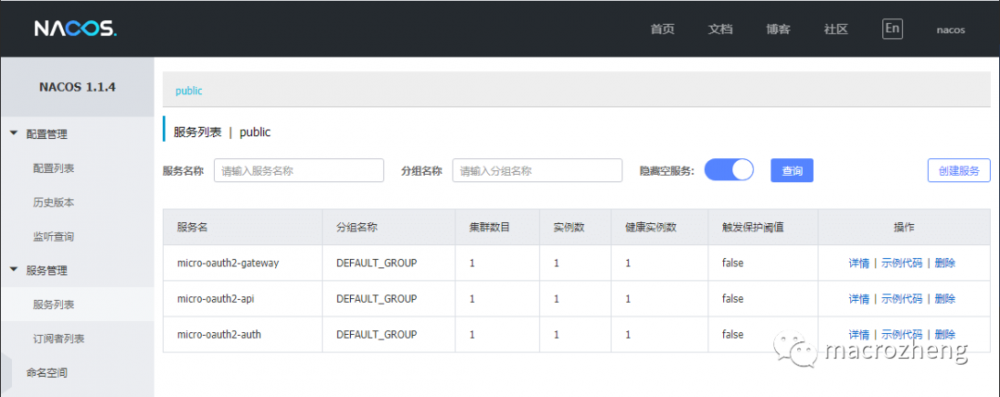
-
使用密码模式获取JWT令牌,访问地址:http://localhost:9201/auth/oauth/token
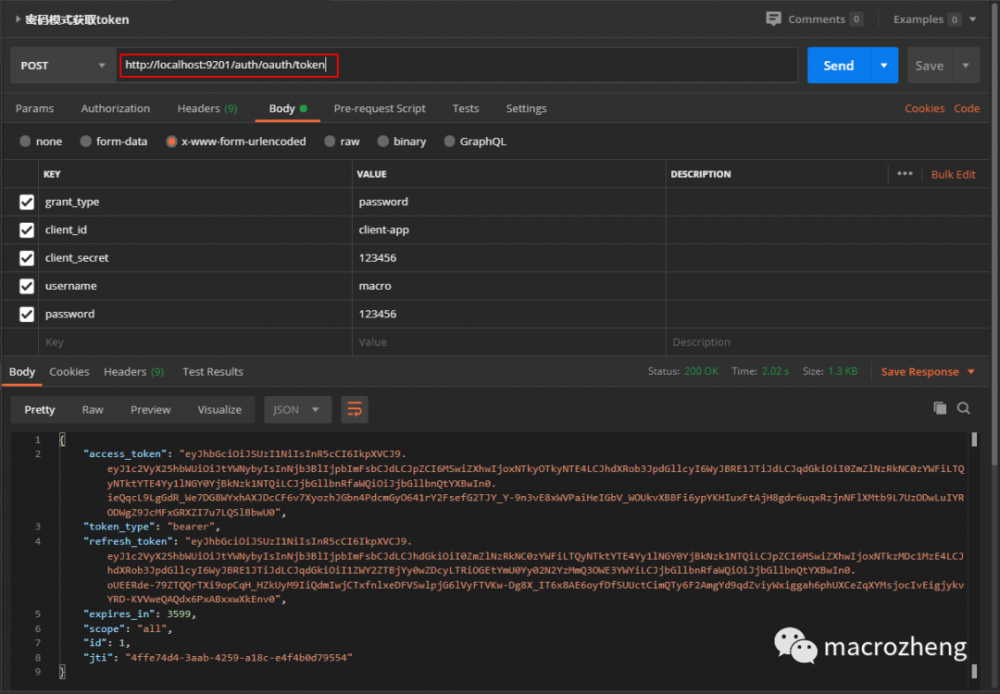
-
使用获取到的JWT令牌访问需要权限的接口,访问地址:http://localhost:9201/api/hello
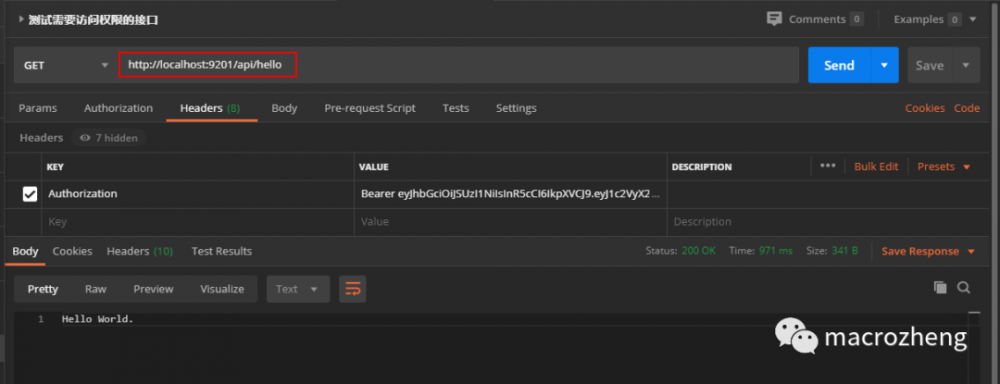
-
使用获取到的JWT令牌访问获取当前登录用户信息的接口,访问地址:http://localhost:9201/api/user/currentUser
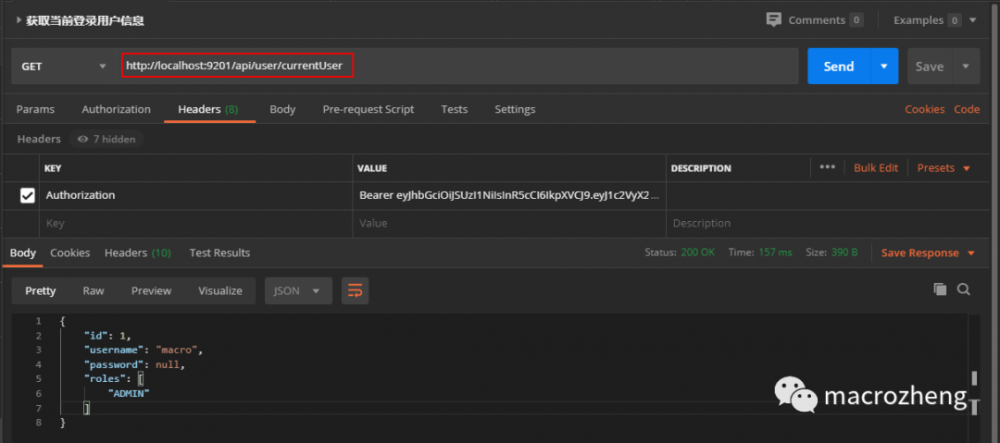
-
当JWT令牌过期时,使用refresh_token获取新的JWT令牌,访问地址:http://localhost:9201/auth/oauth/token
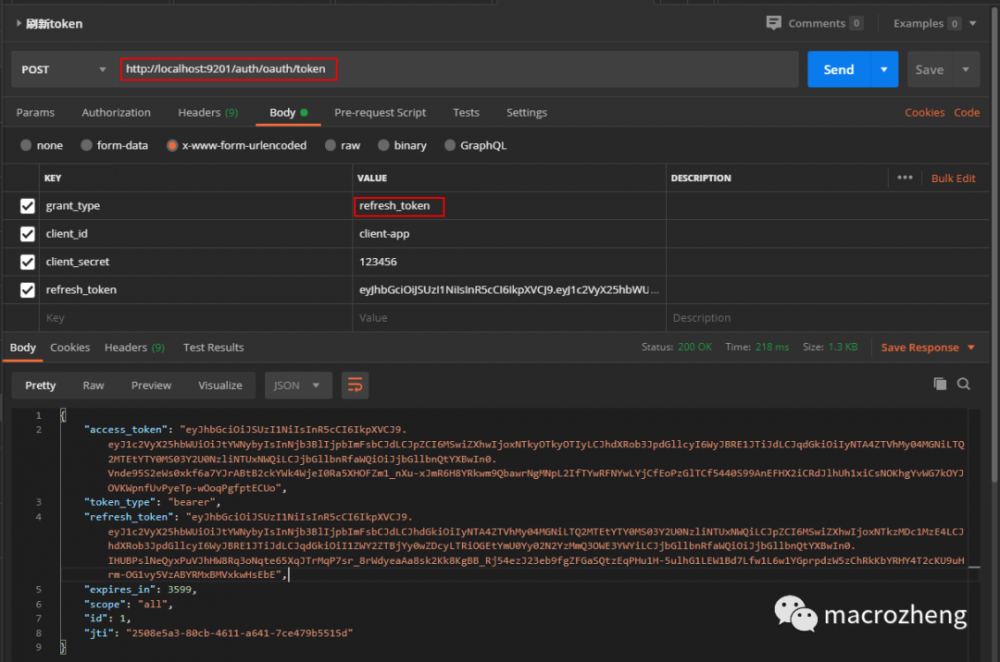
-
使用没有访问权限的
andy账号登录,访问接口时会返回如下信息,访问地址:http://localhost:9201/api/hello
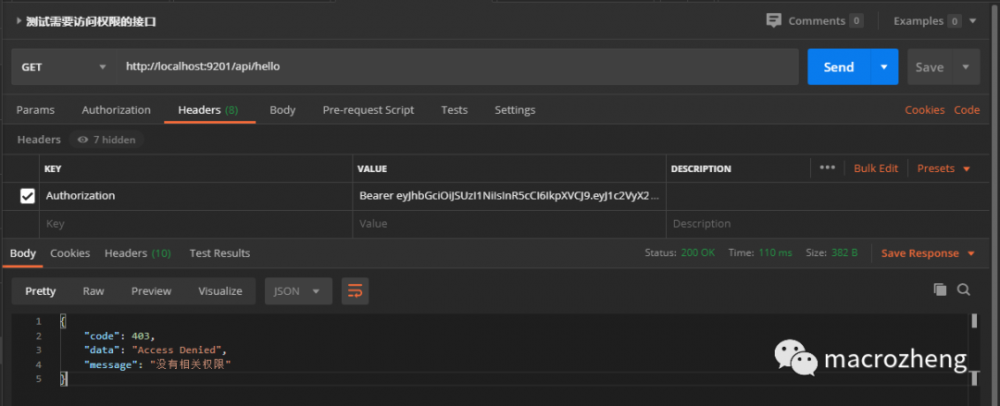
项目源码地址
https://github.com/macrozheng/springcloud-learning/tree/master/micro-oauth2
推荐阅读
-
听说你的JWT库用起来特别扭,推荐这款贼好用的!
-
线上项目出BUG没法调试?推荐这款阿里开源的诊断神器!
-
Spring Boot 把 Maven 干掉了,正式拥抱 Gradle!
-
性能优越的轻量级日志收集工具,微软、亚马逊都在用!
-
15个Github使用技巧,你肯定有不知道的!
-
写了100多篇原创文章,我常用的在线工具网站推荐给大家!
-
还在用Swagger生成接口文档?我推荐你试试它.....
-
你居然还去服务器上捞日志,搭个日志收集系统难道不香么!
-
一个不容错过的Spring Cloud实战项目!
-
我的Github开源项目,从0到20000 Star!

欢迎关注,点个在看
- 本文标签: ip cat IDE CTO list lib Authorization Master Spring cloud 微服务 classpath find redis GitHub key dist message 希望 springcloud 缓存 测试 servlet tar 调试 亚马逊 XML client 神器 IO token equals 服务器 pom UI API json build 文章 ORM bug ArrayList web maven js 配置 RESTful URLs 开源 ACE bean Spring Security HashMap spring tab https map 管理 parse final Word constant Spring Boot 注册中心 rmi authenticate git 安全 开源项目 解析 dependencies http Service id bus tk 认证 struct 网站 微软 App REST src Security 应用架构 配置中心 stream 源码
- 版权声明: 本文为互联网转载文章,出处已在文章中说明(部分除外)。如果侵权,请联系本站长删除,谢谢。
- 本文海报: 生成海报一 生成海报二











![[HBLOG]公众号](https://www.liuhaihua.cn/img/qrcode_gzh.jpg)

